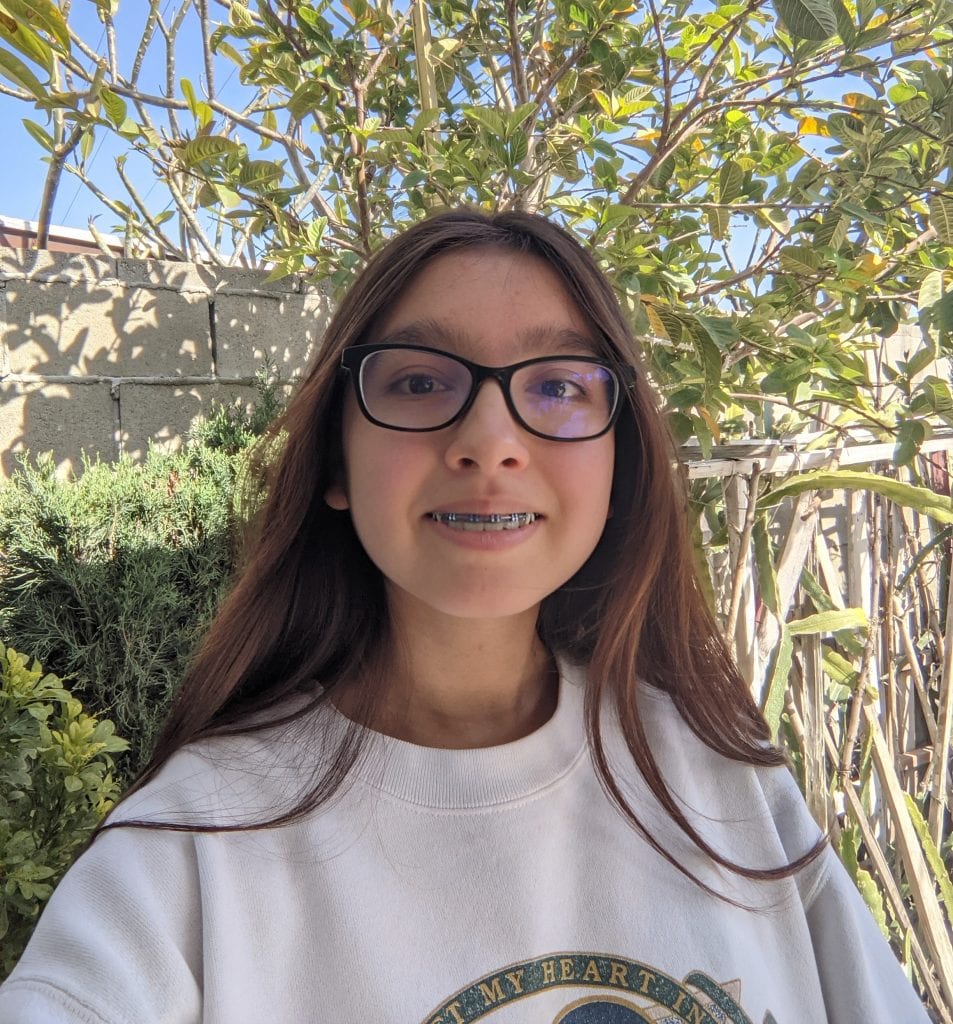EDITOR’S NOTE: This spring, the Omega Sci-Fi Awards hosted its 6th annual live show featuring emerging science-fiction writing talent, including the work of local high school students through The Tomorrow Prize. The nonprofit program was founded in 2014 by Sci-Fest L.A., which aims to recognize and encourage emerging sci-fi writers, and Light Bringer Project, a Pasadena-based nonprofit arts and education organization.
L.A. Parent was a proud co-sponsor of The Tomorrow Prize, and we are happy to publish this year’s winning story, “Star Sailor,” by Pasadena High School student Gwendolyn Lopez.
She is a luminous writer with a mind that shines as bright as the stars. “I never thought that my little idea about a space explorer would make it this far,” Gwendolyn says, “and I’m so honored to be the first place winner of the Tomorrow Prize!” She introduces original ideas about the future and exploration, transporting readers to another world. “Writing ‘Star Sailor’ was challenging,” she says, “but it was also really fun to mix old ideas of exploration with futuristic outer space. I also loved writing out the personalities of the radio and protagonist.” This piece is incredibly thought-provoking and truly captures the talent of the best in L.A.
Star Sailor
On the sunrise of a day long ago, a sailor stared at a sea of glittering tears.
It was a different world. Stars, galaxies—they were all a thing of the future. There was only the salt of the water, the bite of the breeze. And a man, standing at the edge of his world, as eager as the needle of the compass he clutched in his right hand.
I imagine myself as that sailor now, immortalized on the page of a school textbook, as reluctant to yield as the mysteries surrounding him. Both of us with our own seas to sail, except mine is made of the void. Both of us in ships. His is firm, blessed by flora. Mine reeks of metal and oxidizers.
Both of us, alone.
My ship rattles, shaking me back to reality. The cockpit I’m sitting in is dark, with the lights turned down low. A permanent chill fills the air.
A pebble thrust against the universe. That’s me. My similarities with the ancient sailor start to fade, leaving a bitter aftertaste. At least he had a destination—all I have is this stolen hunk of a ship, a cracked photograph of my family, and a dwindling supply of oxygen.
I sigh. It sounds like a thunderstorm in the cramped ship, with only the engine’s whir and the beeping of my location tracker accompanying me.
Beep, beep. I have now entered the Holmberg V system.
Boop, boop. Now I’m in Messier 68.
It’s a faulty thing, a piece of junk. Either that, or what everyone’s been telling me is true.
The universe has already been discovered.
I slouch in my chair. The windshield of my ship is displayed in front of me, showing a view that hasn’t changed in the past month of flying through space. Deep, endless black. No shadows. No light. If I look at it for too long, I start to think it’ll swallow me whole.
I’m not sure when I doze off, but when the location tracker on my ship’s dashboard starts to beep, I instantly jolt up. The sound is different, not a mellow indicator reciting names I already know. Instead, it’s a harsh, blaring alarm. Meaning there’s something new out there, something that isn’t on the star maps.
Heart beating fast, I edge myself forward, leaning so that I can read the small, evenly printed text displayed by the spaceship’s AI.
The name printed out on the dashboard isn’t one I recognize. That’s because there isn’t any name at all.
Foreign celestial body detected, the spaceship AI says in its mechanical voice.
My hands fly over the dashboard, and the spaceship’s AI redirects itself toward the disturbance. I feel like a swarm of bees. My breath is shaky, laced with excitement. This could be it—I’ve finally spotted land from the crow’s nest. The thrill of discovery, glory, and riches! It could all be mine.
My ship slides me out of curved spacetime as smoothly as it guided me in. The universe snaps into focus. I’m met with a simple star system—a G2V star, surrounded by planets ambling around its gravitational pull. I stare in awe as the location tracker beeps away their names, one after the other. I don’t care. There’s something here that doesn’t belong, and for now it’s the only thing that matters.
My ship slows down in front of a blue-green planet, then dips down into its atmosphere. My surroundings shine blue—all seen through a pair of red sunglasses as my ship burns through the ozone layer. When it all clears up, I get my first real look at Foreign Celestial Body.
My stomach does a flip when I spot buildings dotted across the planet’s landscape.
Civilization—meaning intelligent life! At this rate, my portrait will surely be framed alongside the greats!
The ship lands, and I’m bursting at the seams. As quickly as possible, I throw open the doors and let sunlight stream inside. Finally, here I am—standing on a new world!
I’m greeted by a small village. Houses, neatly positioned next to each other, covered with moss and trees and greenery. The people must like plants.
“Hello?” I call out. My voice seems to echo through the village. I clear my throat. “Is anybody there?”
No answer. A bird titters from a tree branch.
“Where am I?” I shout. As a response, the leaves sway in the wind.
The walls of the houses are dirty. Their insides are empty, abandoned.
I’ve wandered into a ghost town.
After a long search, I’ve found nothing. I’m about to head back to my ship and search someplace else when I hear a voice.
My head snaps back, searching for the direction it came from. A rodent scampers in front of me. Wind whistles through the branches above me. And I hear it again.
“Is somebody there?”
“I am!” I call out.
A person! I run toward the voice, who keeps calling out the same words, and eventually I find myself in a house that looks like all the others. Deserted, empty. Except for the voice which gives it life.
But as quickly as the excitement came, it seeps away. There is no life in this house. The voice I’d mistaken for alive was just a beaten up, vintage radio laying on a shelf coated with dust.
“This place is useless,” I mutter.
“Wait!” the radio cries out. I look at it with wide eyes. Did an old, abandoned piece of junk just… talk to me?
“I’m hallucinating,” I say.
“You’re not,” the radio points out. I take three steps closer, lifting it in my hands. The radio is normal. Ancient. Except for the fact that it’s talking to me.
“Who—” I cut myself off. “What are you?”
“I’m an AI. The first one.” The radio pauses. Like it’s contemplating. “No one’s visited me in millenia. Why have you come back to Earth?”
“Earth?” My voice takes a sharp edge. “Visited you?”
“Oh.” The radio suddenly sounds small. “You aren’t here for me.”
“Of course I’m not.” I set the radio back down. My hands are covered with dust, and I wipe them on my trousers. “I’m an explorer,” I declare. “I came because I’m sick of being no one. People told me I was crazy, to go looking for something. Well, now look! An entire planet. Not on the star maps. And it’s all mine.”
The radio is quiet for a long time. “You’re wrong.”
“I’m wrong?”
“There is always something to explore,” says the radio softly. “You don’t need a planet, or thousands of light years, to be somebody.”
My words dry up in my throat. It feels like the radio is fixing me with a stare, even though that’s impossible. Radios don’t have voices. And they definitely don’t have eyes.
“Do you know why there’s no one here?” the radio asks.
I blink. That wasn’t what I was expecting.
“…Tell me.”
“Everyone left. They spread out their wings, flew across the universe. Into its nooks and crannies, into places no one had seen before. And so when the fossil fuels of this planet shriveled up, they packed up their things and passed the reins back to Mother Nature.” The radio hums a soft tune. It sounds familiar. “As it should be.”
“But who’s ‘they’?”
“Humanity, of course.” My mouth opens wide in shock. The radio chuckles. “Did your teachers skip that lesson in history class?”
“That’s stupid,” I say. “Why would humans stay on just one planet? Why not just wormhole over to another star system? Why—” I gesture at the abandoned houses, at the grass and the birds singing duets in the trees. “Why this?”
“This is where it started,” the radio says. “This is where it ends. But not for you. Not for everyone else. For you, it’s a new beginning.”
I slam my foot against the ground in frustration. “But this was supposed to be my planet. My discovery. You can’t just take that away from me.”
“Look all you want. You’ll find nothing.”
I turn my back on the radio and leave.
The sea of my home planet reminds me of the sun. It is bright. Cheerful. Liquid laughter, rather than tears.
The scars of outer space slowly fade away, and I find my way home. The radio was right. There was nothing left for me on the mysterious planet of Earth. Nothing that hadn’t been done already.
_________________________________
Sleeplessness invades my nights. I can’t stop thinking about that lonely AI on planet Earth. Humming that sad, familiar tune to itself. Waiting for a visitor who will never come.
To cope, I start to sail. On the ocean, instead of the unforgiving void. It’s fun. Terrifying. Being given control without the safety net of spaceship AI. I become my own sailor, one of a new world.
One of my world.
The sun sets. I look up at the map of my future. And it is completely blank, left there for me to fill out.
Gwendolyn Lopez is a sophomore at Pasadena High School. She is trilingual and speaks English, Spanish, and Mandarin. Outside of school, Gwendolyn enjoys reading, looking at cloud patterns in the sky, and writing fiction that has sci-fi or fantasy elements. Her short story, “Star Sailor,” was inspired by the 16th-century explorers in her history textbook and the mysteries of outer space.
































